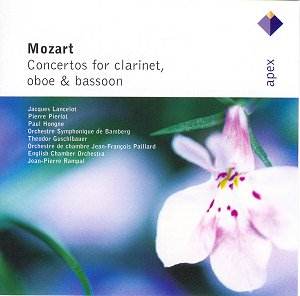Warner Classics have
been trawling their extensive back catalogue
to compile a release of three concertos
for reed instruments with three different
orchestras, conductors and soloists.
Undoubtedly Mozartís concertos for piano
take the limelight in terms of numbers
of recordings and performances and overshadow
the woodwind concertos. This is unfair
as these are excellent works, rich in
invention and lyricism, which I consider
to be real gems of classical music.
The Clarinet Concerto
K.622 (1791) is unquestionably the finest
of the three works here and the most
widely admired. In fact Mozartís writing
for the clarinet reaches heights of
sublime quality as also seen in the
wonderful Clarinet Quintet K. 581 and
the Clarinet Quartet K.374f. The Clarinet
Concerto was written specifically for
Anton Stadler and was Mozartís final
concerto in any form, being completed
just two weeks before the composerís
death in 1791. The work was originally
conceived as a concerto for basset-horn
and then for a basset-clarinet before
its final adaptation as a Clarinet Concerto.
The clarinet soloist
Jacques Lancelot is in excellent form
in a concerto that has been described
as one of Mozartís, "most sublime
and consummate achievements." Lancelot
easily provides the necessary sense
of ebullience and youthful vitality
in the Allegro and is charming
and persuasive in the profound lyricism
of the heartfelt Adagio. Overall the
soloist cultivates the beauty of the
work and displays a fine tone and control
throughout. In addition the Orchestre
de Chambre Jean-François Paillard
under Jean-François Paillard
offer a confident and compelling interpretation.
The second work on
this Apex release is the Oboe Concerto
K.314 which is thought to have been
composed for soloist Giuseppe Ferlendis
in 1777. The orchestral parts were lost
for many years until being discovered
in 1920 in the Salzburg Mozarteum library.
On this release Pierre Pierlot is clearly
fully attuned to the innate sophistication
of the concerto displaying a high degree
of virtuosity and creativity for the
technical and artistic demands of the
score. The English Chamber Orchestra
under Jean-Pierre Rampal give a most
sympathetic performance complementing
the fine work of the soloist.
The Bassoon Concerto
K.191 was composed in 1774 and for the
most part the concerto is in the galant
style; so typical of Mozartís writing
at this time. The Bamberg Symphony Orchestra
under Theodor Guschlbauer give a fine
performance of the beautifully coloured
and crafted orchestration. Soloist Paul
Hongne is on top form giving an assured
and most lyrical performance that has
that innate sense of music-making. He
makes a beautiful sound instilling life
into every bar of his performance.
My particular favourite
versions of the Clarinet and the Bassoon
Concertos are from the Vienna Philharmonic
Orchestra under Karl Böhm, with
Alfred Prinz, clarinet and Dietmar Zeman,
bassoon, on Deutsche Grammophon 457
719-2. My preferred version of the Oboe
Concerto is an interpretation from the
Chamber Orchestra of Europe under maestro
Berglund with Douglas Boyd, oboe, from
ASV digital CDCOE 808.
On this Apex release
we are not given any information concerning
the recording venues and dates. However
the Apex label use previously released
material and I can deduce that these
performances were originally released
on the Erato Disques label back in 1963,
1969 and 1979. The sound engineers have
provided a warm and satisfactory sound
quality and the booklet notes are concise,
interesting and informative.
Although not my first
choices in these works I cannot imagine
any listener being disappointed. Fine
performances and agreeable sound quality.
Well worth the modest investment.
Michael Cookson
